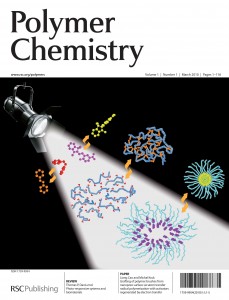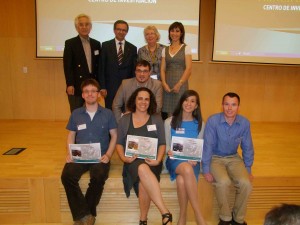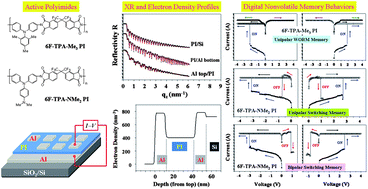 Dr. Anna Carlmark received her PhD in polymer technology in 2004 from Fibre and Polymer Technology at KTH Royal Institute of Technology in Sweden, under the supervision of Prof. Eva Malmström. Between 2004-2007 she was employed as a researcher in several industries in Sweden (GE Healthcare AB, Gyros AB and SweTree Technologies AB) before she rejoined the group of Prof. Malmström in 2007 as an assistant professor in the division of Coating Technology at KTH. Her research focus is within the fields of controlled radical polymerization, the synthesis of complex macromolecular architectures, functional surfaces and (bio)fibre modifications. (http://www.kth.se/en/che/divisions/coating-technology)
Dr. Anna Carlmark received her PhD in polymer technology in 2004 from Fibre and Polymer Technology at KTH Royal Institute of Technology in Sweden, under the supervision of Prof. Eva Malmström. Between 2004-2007 she was employed as a researcher in several industries in Sweden (GE Healthcare AB, Gyros AB and SweTree Technologies AB) before she rejoined the group of Prof. Malmström in 2007 as an assistant professor in the division of Coating Technology at KTH. Her research focus is within the fields of controlled radical polymerization, the synthesis of complex macromolecular architectures, functional surfaces and (bio)fibre modifications. (http://www.kth.se/en/che/divisions/coating-technology)
What was your inspiration in becoming a chemist?
Initially, I was really interested in biology, but in high school I stumble onto biochemistry which I thought was really fascinating as it explained so much about biological systems and even our own bodies. When I started university to goal was really to become a biochemist. Of course, I had no really insight into this field, and at the university I found myself much more drawn towards organic and polymer chemistry, and I found biochemistry quite tedious and boring. So I became a polymer chemist, which I have no regrets about!
What was the motivation to write this review? (DOI: 10.1039/C1PY00445J)
We (Prof Eva Malmström and I) have been working in the field of grafting cellulose by controlled radical polymerization for quite some time, actually 10 years this year, and we thought it was a nice idea to put a review together in this field. We had been talking about if for a couple of years, and so when I was invited to write a review for Polymer Chemistry it was perfect timing. I was very happy and honoured to receive the invitation!
Why did you choose Polymer Chemistry to publish your work?
Polymer Chemistry is a hot new journal that is really “up and coming”. The readers are well reflected in our research field and we thought it was the perfect choice for the review.
In which upcoming conferences may our readers meet you?
Unfortunately, I have no current plans to attend any conferences as I am having a baby in September. Usually I try to attend the ACS fall meetings, and in this case the earliest I will go will be in fall 2013.
How do you spend your spare times?
I have two small children (ages 3 and 2) and a third on the way, so I keep myself pretty busy with the kids. We also have a country house where I love to go in the summer time. The Swedish archipelago is one of the most beautiful places in the world and a favourite place of mine, and I can warmly recommend a visit!
Which profession would you choose if you were not a scientist?
I considered becoming a nurse or physical therapist for a long time. I am very impressed with people working in medicine as I think they are true heroes. So if I was not a scientist, I think that is something that I would like to do.
 Congratulations to Adam J. Gormley, Inmaculada Conejos-Sánchez, Paula Ofek, Stefan Hoffmann & Corinna Fetsch for winning the Polymer Chemistry poster prizes at the 9th International Symposium on Polymer Therapeutics: From Laboratory to Clinical Practice.
Congratulations to Adam J. Gormley, Inmaculada Conejos-Sánchez, Paula Ofek, Stefan Hoffmann & Corinna Fetsch for winning the Polymer Chemistry poster prizes at the 9th International Symposium on Polymer Therapeutics: From Laboratory to Clinical Practice.












